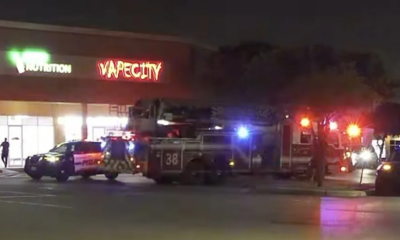Preparedness
Gun-Law Twist: Off-Duty Cop’s Killer May Dodge Prison Sentence

The legal saga surrounding a domestic tragedy that resulted in the death of an off-duty police sergeant in Michigan might conclude without the alleged perpetrator spending any time behind bars. The case hinges on an incident of apparent domestic violence in mid-2019 that culminated in the fatal shooting of Elaine Williams, a mother of two and a 14-year member of the Detroit Police Department (DPD).
Williams’ live-in boyfriend, Eddie Ray-Jr. Johnson, was the one who allegedly pulled the trigger. The couple had spent the evening socializing with neighbors before an argument broke out upon their return home. As the situation escalated, the confrontation turned fatal, leaving Williams dead from multiple gunshot wounds and Johnson injured from one.
The tragic events unfolded just before midnight when the police received reports of a shooting at the couple’s home. Upon arrival, they found Williams already dead and Johnson, also shot, in a critical condition. Both had blood-alcohol levels significantly above Michigan’s legal limit for driving.
After the investigation, the police revealed that eight .40 caliber shell casings found at the scene all originated from Williams’ service weapon, a Smith and Wesson pistol issued by her department. Johnson was arrested immediately and, after surgery for his gunshot wound, claimed that he had shot Williams in self-defense after she shot him.
“In this case, where both parties were shot with the same gun, the order of events is open to multiple interpretations,” said Wayne County prosecutor Kym Worthy. “Considering our burden of proof, we believe this is an appropriate resolution.”
Johnson, now 40, was initially charged with first-degree murder and felony firearm but was offered a plea deal by prosecutors that included no jail time, only probation for three years. If he violates the terms of his probation, he could face up to 15 years in prison. Johnson, who arrived in court in a wheelchair wearing an arm brace, pleaded no contest to manslaughter.
“The heart of the Detroit Police Department still breaks at the tragic death of Sergeant Elaine Williams,” said Detroit Police Chief James White. “This plea deal is not the outcome that the DPD wanted for Sgt. Williams’ loved ones, but we understand the unique circumstances of this case and therefore accept the Prosecutor’s decision.”
However, not everyone is happy with the outcome. Retired Detroit Police Assistant Chief Steve Dolunt expressed his concern about Johnson potentially avoiding jail time.
“I know a lot of cops aren’t going to be happy about this,” Dolunt stated. “I don’t have all the facts, but probation seems awfully lenient. It seems they could’ve tried to charge him with involuntary manslaughter, at least.”
The fate of Johnson now rests in the hands of a judge who will have to approve the plea deal. Johnson’s sentencing hearing is set for June 14 with Wayne County Circuit Judge Charise Anderson. Johnson’s attorney, Raymond Burkett, has not yet commented on the case.
Watch a local news report about the incident below:
Let us know what you think, please share your thoughts in the comments below.

Preparedness
Unlock Homesteading Secrets: Navigate Legal Hurdles for Self-Sufficiency

Homesteading has captured the imagination of many Americans eager to embrace a more self-sufficient lifestyle. However, the dream of living off the land is heavily influenced by the homesteading laws and restrictions in your area.
While every state in the U.S. permits homesteading, the degree of friendliness towards homesteaders varies significantly. However, it’s crucial to remember that state approval doesn’t necessarily equate to local acceptance.
For instance, in New York, homesteading is restricted to specific boroughs, and many Homeowners Associations (HOAs) impose limitations on keeping small livestock. Hence, it’s vital to thoroughly research local homesteading laws to understand what is feasible for your homestead.
The concept of homesteading is deeply rooted in American history. “The 1862 Homestead Act accelerated settlement of U.S. western territory by allowing any American, including freed slaves, to put in a claim for up to 160 free acres of federal land,” according to The History Channel. This act required settlers to reside on the land for five years, build a home, and cultivate the land.
Although the Homestead Act was repealed in 1976, homesteading continues under new laws that safeguard the rights of modern-day homesteaders. Today, homesteading encompasses self-sufficiency practices, from growing food to sustainable living, whether in rural expanses or urban rooftops.
The type of homestead you establish largely depends on the “laws of the land.” Many states offer homestead rights through a Declaration of Homestead. As Mother Earth News notes, “A Declaration of Homestead is a simple legal document which can help to protect your house and property in times of economic hardship.” These statutes aim to preserve family homes from creditors during financial difficulties.
The extent of these protections varies by state. For example, Indiana allows individuals to claim up to $10,000 of their property as a homestead, with no maximum size restriction, offering considerable protection from creditors.
Local regulations also play a crucial role. Deed restrictions may limit what you can do with your property, such as prohibiting fences for livestock. Zoning regulations might restrict selling homemade goods, and building codes could dictate the materials and structures you can use.
Access rights, like easements for utility workers, must also be considered. These rights may prevent you from constructing anything that obstructs access to essential services.
Raising livestock is a common aspect of homesteading, but it comes with its own set of legal challenges. Regulations can vary widely, with some areas allowing chickens while others may have ordinances against them. Additionally, licensing may be required for certain activities, like stocking a pond with specific fish species.
Selling homemade products is another area subject to regulation. “New cottage food laws allow the sale of items made within home kitchens, but details vary by state,” according to Countryside. These laws often restrict certain foods to ensure consumer safety.
Wildlife protection laws can also impact homesteaders, as animals like deer and raccoons may pose challenges. Furthermore, some localities have laws prohibiting edible gardens in front yards, so it’s essential to verify these regulations before planting.
Beekeeping and rainwater harvesting are popular homesteading activities, but both are subject to strict regulations. Local laws may limit the number of beehives you can keep, and while rainwater harvesting is encouraged in Texas with tax incentives, it remains illegal in Colorado.
In summary, while the allure of homesteading is strong, it’s imperative to navigate the complex web of laws and restrictions that govern this lifestyle. Thorough research and understanding of local regulations are essential steps for any aspiring homesteader.
Let us know what you think, please share your thoughts in the comments below.
Preparedness
Shield Your Crops from Heavy Rains with These Tactics

As spring and summer approach, so do the heavy rains that can threaten the crops we depend on. These downpours can result in waterlogging, soil erosion, and plant diseases, making it crucial to employ strategies for safeguarding crops from such weather.
The key to ensuring crop survival and productivity lies in effective protection methods.
One of the most fundamental steps in crop protection is establishing a proper drainage system. Without it, even the most well-covered crops can suffer. “You can cover and protect your crops as much as you’d like, but if you don’t have adequate drainage, you may do a lot of work for nothing.”
A well-maintained drainage system ensures that water flows freely and helps prevent soil erosion. Simple measures, like digging canals or channels, can direct excess water away from your garden.
For those in regions prone to heavy rainfall, installing an underground drainage system can be beneficial. This setup helps remove excess water from the soil, preventing waterlogging and its detrimental effects on plant roots.
The condition of the soil is another critical aspect to consider. Waterlogged soil can reduce oxygen levels, leading to root rot and stunted growth. Preparing fields before planting to ensure proper drainage and aeration can make a significant difference.
Mulching is another effective method to combat heavy rains. By covering the soil, mulch reduces erosion and prevents rainwater from washing away valuable soil particles.
In addition to drainage and soil preparation, rain covers offer a direct way to shield crops from excessive water. These covers should be durable and tear-resistant to withstand both heavy rain and wind.
Row covers, made from materials like polypropylene or polyethylene, are lightweight and breathable. They allow water and air to pass through while keeping insects and pests at bay. Row covers are particularly useful for protecting delicate crops like lettuce and spinach.
Moreover, row covers can safeguard young seedlings from harsh weather conditions. They are easy to install and can be removed once the weather improves.
Tarps provide another layer of protection for gardens. Constructed from durable materials such as canvas or vinyl, tarps create a temporary shelter against rain and wind. To prevent them from blowing away during storms, it’s essential to anchor tarps securely with stakes or weights.
Plastic sheeting is a cost-effective solution for crop protection. It can serve as a temporary greenhouse or cover for garden beds. When using plastic sheeting, ensure it’s securely anchored and ventilated to prevent moisture buildup.
Be cautious not to use overly thick plastic, as it can trap heat, causing plants to overheat and dry out. Proper ventilation is key to maintaining a healthy environment for your crops.
By implementing these strategies, homesteaders can effectively protect their crops from the challenges posed by heavy rains, ensuring a bountiful harvest.
Let us know what you think, please share your thoughts in the comments below.
Preparedness
Master Your Digital Privacy with These Essential Security Tips

Navigating the digital landscape requires a blend of awareness and action to safeguard your privacy and security. Just as you wouldn’t welcome a stranger peering through your window, you shouldn’t allow digital intrusions into your personal data. Protecting yourself online involves understanding and addressing four key areas: local device security, the potential misuse of smart devices, cloud data management, and secure data transmission.
Your local devices, such as phones and computers, are treasure troves of personal data. It’s crucial to secure these devices against unauthorized access. Similarly, devices like smart doorbells and virtual assistants can be exploited if not properly managed. Your data stored in the cloud, like email accounts or financial information, is another critical area, as it resides on servers beyond your direct control. Lastly, the connections that transfer data between your devices and the internet are vulnerable to interception.
To enhance your online security, consider utilizing tools developed by organizations like the Electronic Frontier Foundation (EFF), which offers resources such as the Privacy Badger browser extension. Supporting these organizations through donations can help them continue their vital work.
A fundamental concept to grasp is that the cloud consists of computers you don’t own. When you sync a photo from your phone to services like Google Photos or iCloud, it exists both on your device and on the service provider’s servers. While the cloud is integral to modern conveniences, it’s important to use it wisely.
When it comes to communication, avoid using SMS, an outdated and insecure texting protocol. Instead, opt for encrypted messaging apps like Signal, which Edward Snowden recommends as the best in its class. Signal offers encrypted messaging, voice, and video calls, ensuring your conversations remain private.
Physical security measures, such as camera covers and microphone blockers, can protect against unwanted surveillance. Look for devices with physical kill switches that cut power to cameras and microphones, ensuring they can’t be activated without your consent.
For web browsing, choose privacy-focused browsers like Brave, which respect user privacy while offering familiar features. Many browsers now include privacy settings, such as “do not track” options, to enhance security.
Email services also play a crucial role in privacy. Unlike Gmail, services like Proton Mail prioritize user privacy and are less likely to cooperate with government surveillance. Proton Mail encrypts emails and is based in Switzerland, offering a higher level of protection.
A strong password strategy is essential. Use complex, unique passwords for each account to prevent hackers from exploiting your credentials across multiple platforms. Password managers can help you generate and store these passwords securely.
Virtual Private Networks (VPNs) offer another layer of security by encrypting your internet traffic and masking your online activities. However, choose a reputable VPN service that doesn’t log user data and is based in a privacy-friendly jurisdiction.
Two-factor authentication (2FA) adds an extra security layer by requiring a second verification step, such as a code sent to your phone. This makes it harder for unauthorized users to access your accounts, even if they have your password.
Finally, encrypting local files on your devices ensures that even if someone gains physical access, they can’t easily read your data. Many devices now include encryption features that operate seamlessly in the background.
In conclusion, staying secure online requires a proactive approach and a combination of tools and practices. By understanding how digital systems work and making informed decisions, you can better protect your personal information in an increasingly connected world.
Let us know what you think, please share your thoughts in the comments below.
-

 Tactical1 year ago
Tactical1 year ago70-Year-Old Fends Off Intruder with Lead-Powered Message
-

 Tactical1 year ago
Tactical1 year agoVape Shop Employee Confronts Armed Crooks, Sends Them Running
-

 Preparedness12 months ago
Preparedness12 months agoEx-Ballerina’s Guilty Verdict Sends Tremors Through Gun-Owner Community
-

 Preparedness10 months ago
Preparedness10 months agoGood Samaritan Saves Trooper in Harrowing Interstate Confrontation
-

 Tactical1 year ago
Tactical1 year agoMidnight SUV Theft Interrupted by Armed Homeowner’s Retaliation
-

 Survival Stories2 years ago
Survival Stories2 years agoEmily’s 30-Day Experience of Being Stranded on a Desert Island
-

 Preparedness10 months ago
Preparedness10 months agoArizona Engineer’s Headless Body Found in Desert: Friend Charged
-

 Preparedness10 months ago
Preparedness10 months agoBoy Saves Dad from Bear Attack with One Perfect Shot
Thomas Robel
May 16, 2024 at 12:44 pm
When are we going to learn, if you keep giving lite or no penalties, crime of all kinds is going to run ramped. We have become a society of pussies, sorry i mean forgivers, no that is not right ether. I just get so mad with all this. We need to bring back stiffer penalties, even the death scents, not for this but for the cold blooded murders happening every day. THE PENALTIES MUST FIT THE CRIME!!! Or crime will keep happening.
Gerald Hallman
May 16, 2024 at 4:05 pm
I am a firm believer in innocence until proven guilty and that guilt should be established in court, not in public opinion. Sometimes the actual truth will not be known and the guilt unproven. However the government should never have the ability to sentence someone based on popular opinion and undue influence of the media. The taking of another’s life should always be examined fully and all evidence provided to either justify or condemn the actions of all those involved.
Rich
May 19, 2024 at 12:28 pm
The level of alcohol the couple drank the evening of the crime played a major part to this volatile situation. What was not established, at least in this article, is which one introduced the off duty officers gun into their argument and who shot who first.
The first probable scenario is that the firearm was the woman’s, department issued handgun, so more than likely she had possession of her gun in her purse. The question is did she introduce her gun because her boyfriend was physically assaulting her and she shot him the one time, before her boyfriend wrestled her gun away from her grasp and fired the 8-shots fired at her.
This article doesn’t state if there was any other witnesses, aside from her boyfriend, who lived to give his side of what happened. The Sergeant, who did not survive does not get to give her side of the story.
Due to this fact, it’s obviously difficult to determine exactly what happened during the night of this senseless incident.
john michael
May 19, 2024 at 4:58 pm
this is baloney. He apparently got the gun away from her and was, therefore no longer in danger of being shot by her. Accordingly, his claim of self-defense is ridiculous and he had no reason to shoot her multiple times. Nothing worse than a lazy prosecutor. Hopefully the judge will deny the deal.